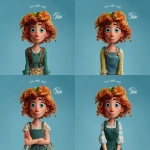Explore the Best AI Image Gallery

Quantum Leaps: How Quantum Computing is Redefining Creativity
The realm of creativity is on the cusp of a seismic shift, driven by the emergence of quantum computing. This revolutionary technology, harnessing the power of superposition and entanglement, promises to unlock unprecedented capabilities for artists, designers, and innovators across industries. From generating novel artistic expressions to revolutionizing design processes, quantum computing is poised to reshape the very fabric of creative expression.
A Quantum Canvas: Unleashing New Artistic Possibilities
Imagine a world where AI-powered by quantum algorithms can compose symphonies, generate intricate sculptures, or paint masterpieces that defy human comprehension. Quantum computings ability to process vast datasets and explore complex simulations opens doors to entirely new artistic frontiers.
- Generative Art: Quantum algorithms can analyze existing artworks and learn artistic patterns, enabling them to create original pieces in various styles.
- Interactive Experiences: Imagine immersive installations where quantum computing generates real-time visuals and soundscapes that respond to viewer movements and emotions.
- Personalized Creations: Quantum algorithms could tailor artworks to individual preferences, generating unique pieces based on user input and data.
Quantum Design: Transforming the Creative Process
Beyond art, quantum computing has the potential to revolutionize design processes across various fields.
- Materials Science: Quantum simulations can help designers explore the properties of novel materials at an atomic level, leading to breakthroughs in architecture, fashion, and technology.
- Product Development: Quantum algorithms can optimize product designs for efficiency, durability, and aesthetics, accelerating the development cycle.
- Urban Planning: Quantum simulations can model complex urban environments, aiding in sustainable city planning and infrastructure development.
Ethical Considerations: Navigating Uncharted Territory
As quantum computing enters the creative domain, it raises crucial ethical considerations that require careful attention.
- Bias and Fairness: Quantum algorithms trained on biased data could perpetuate existing societal inequalities in creative outputs.
- Ownership and Authorship: Questions arise about the ownership and attribution of artworks generated by quantum algorithms. Who is the true creator – the programmer, the algorithm, or the user?
- Accessibility and Equity: Ensuring equitable access to quantum computing resources and benefits for all creative individuals is paramount.
Future Trends: A Quantum Leap Forward
The future of creativity in the quantum era is brimming with possibilities. Continued advancements in quantum hardware and software will drive further innovation, leading to:
- Quantum-enhanced Creative Tools: Specialized software platforms will empower artists and designers to harness the full potential of quantum computing.
- Hybrid Creativity: The convergence of quantum computing with human creativity will give rise to entirely new artistic forms and expressions.
- Decentralized Creative Platforms: Blockchain technology combined with quantum computing could enable decentralized marketplaces for creative works, fostering collaboration and ownership.
Quantum computing is poised to revolutionize the creative industry, unlocking unprecedented possibilities for artistic expression, design innovation, and collaborative creation. By embracing this transformative technology responsibly and ethically, we can usher in a new era of creativity that transcends the boundaries of imagination.

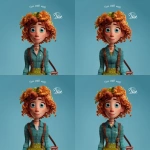


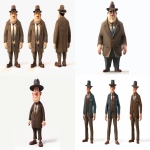

](https://images.ai-img.art/thumbnails/150/4f3d83c4b1d979b5be00f4ea80d67b71c0335bc1163e692d738e553ac37709e5.webp)
![**ultra detailed 8k cinematic black and white beauty portrait of a young woman from chest up, vertical frame, face, hands and hair filling the composition, smooth neutral grey studio background with soft dark vignette on the edges, center of the frame is her eye, lips and finger in a "shh" gesture oval symmetrical face with soft but well defined features, ultra smooth flawless skin, no pores, no wrinkles, perfect beauty retouch, straight elegant nose with soft highlight along the bridge and gentle shadow under the tip full sensuous lips with a sharp cupid’s bow, slightly parted, a thin bright glossy highlight strip on the lower lip emphasizing volume, subtle light reflection on the lip gloss one eye visible through a gap between fingers, other eye mostly hidden by the upper hand, long thick eyelashes like fake lashes, small bright catchlight in the pupil, upper eyelid with smoky eye makeup, darker tone along lash line fading smoothly towards the brow, dark thick well shaped eyebrows, gently arched, not overdramatic dark wavy hair, big glossy waves falling down, one clear S-shaped wave on the right side of the frame, soft highlights along the strands to show texture, hair swept away from the cheeks so the face is not covered both hands in thin semi-transparent black gloves up to the forearm, upper hand placed horizontally across the upper face, back of the hand towards camera, fingers slightly spread so that one finger is above the brows and another lower finger creates a narrow gap that reveals the eye, fingertips long and tapered, sharp stiletto-like nails visible under the sheer fabric, subtle darker seams along the fingers and glove edges lower hand bent so that the index finger is vertical and gently touching the center of the lips in a classic "shhh" pose, [...]** - Image #3 <@1264899319799222315>](https://images.ai-img.art/thumbnails/150/4c03a422708b372b43caaee1e2929933c40f0a13dc069beeeb228a60b126223b.webp)
](https://images.ai-img.art/thumbnails/150/e07ad2e7379a835127482b0fd3176192c001c90e68a85b4315cf482b6a3f5ea5.webp)



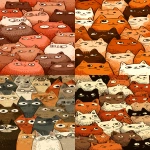

![**ultra detailed 8k cinematic black and white beauty portrait of a young woman from chest up, vertical frame, face, hands and hair filling the composition, smooth neutral grey studio background with soft dark vignette on the edges, center of the frame is her eye, lips and finger in a "shh" gesture oval symmetrical face with soft but well defined features, ultra smooth flawless skin, no pores, no wrinkles, perfect beauty retouch, straight elegant nose with soft highlight along the bridge and gentle shadow under the tip full sensuous lips with a sharp cupid’s bow, slightly parted, a thin bright glossy highlight strip on the lower lip emphasizing volume, subtle light reflection on the lip gloss one eye visible through a gap between fingers, other eye mostly hidden by the upper hand, long thick eyelashes like fake lashes, small bright catchlight in the pupil, upper eyelid with smoky eye makeup, darker tone along lash line fading smoothly towards the brow, dark thick well shaped eyebrows, gently arched, not overdramatic dark wavy hair, big glossy waves falling down, one clear S-shaped wave on the right side of the frame, soft highlights along the strands to show texture, hair swept away from the cheeks so the face is not covered both hands in thin semi-transparent black gloves up to the forearm, upper hand placed horizontally across the upper face, back of the hand towards camera, fingers slightly spread so that one finger is above the brows and another lower finger creates a narrow gap that reveals the eye, fingertips long and tapered, sharp stiletto-like nails visible under the sheer fabric, subtle darker seams along the fingers and glove edges lower hand bent so that the index finger is vertical and gently touching the center of the lips in a classic "shhh" pose, [...]** - Image #1 <@1264899319799222315>](https://images.ai-img.art/thumbnails/150/ff5a24c7c060f5350508823c406c28c9596aea4e37eefb60abc0f37504a37383.webp)
![**ultra detailed 8k cinematic black and white beauty portrait of a young woman from chest up, vertical frame, face, hands and hair filling the composition, smooth neutral grey studio background with soft dark vignette on the edges, center of the frame is her eye, lips and finger in a "shh" gesture oval symmetrical face with soft but well defined features, ultra smooth flawless skin, no pores, no wrinkles, perfect beauty retouch, straight elegant nose with soft highlight along the bridge and gentle shadow under the tip full sensuous lips with a sharp cupid’s bow, slightly parted, a thin bright glossy highlight strip on the lower lip emphasizing volume, subtle light reflection on the lip gloss one eye visible through a gap between fingers, other eye mostly hidden by the upper hand, long thick eyelashes like fake lashes, small bright catchlight in the pupil, upper eyelid with smoky eye makeup, darker tone along lash line fading smoothly towards the brow, dark thick well shaped eyebrows, gently arched, not overdramatic dark wavy hair, big glossy waves falling down, one clear S-shaped wave on the right side of the frame, soft highlights along the strands to show texture, hair swept away from the cheeks so the face is not covered both hands in thin semi-transparent black gloves up to the forearm, upper hand placed horizontally across the upper face, back of the hand towards camera, fingers slightly spread so that one finger is above the brows and another lower finger creates a narrow gap that reveals the eye, fingertips long and tapered, sharp stiletto-like nails visible under the sheer fabric, subtle darker seams along the fingers and glove edges lower hand bent so that the index finger is vertical and gently touching the center of the lips in a classic "shhh" pose, [...]** - Image #2 <@1264899319799222315>](https://images.ai-img.art/thumbnails/150/d87499f6bdc5a4a822aea4674654f70073b052542a1aaa1d08461a13ca2e07f9.webp)
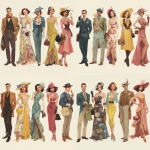
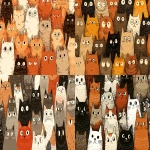
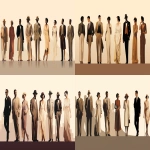





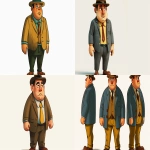
](https://images.ai-img.art/thumbnails/150/1871c145bfe0276c6e1bacf6ec0da6d2dae71370bf71674589af29a201acdd5f.webp)
](https://images.ai-img.art/thumbnails/150/5487dcbcab0cd5702a67cc6819342ef56c05d0fc7730bfb7718ee291f10c3da3.webp)
](https://images.ai-img.art/thumbnails/150/7c4350a99935771fe343a7ae65c780cf4cd6b861e69cdc32bd58a3a92fb2476f.webp)


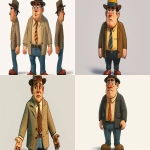


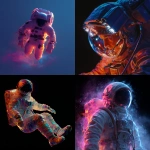

](https://images.ai-img.art/thumbnails/150/f3411154f4c743a26f102ecfc985f3f6214e93b285748fac66c88f3b52f85b26.webp)

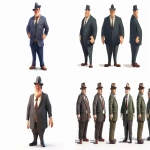



![**ultra detailed 8k cinematic black and white beauty portrait of a young woman from chest up, vertical frame, face, hands and hair filling the composition, smooth neutral grey studio background with soft dark vignette on the edges, center of the frame is her eye, lips and finger in a "shh" gesture oval symmetrical face with soft but well defined features, ultra smooth flawless skin, no pores, no wrinkles, perfect beauty retouch, straight elegant nose with soft highlight along the bridge and gentle shadow under the tip full sensuous lips with a sharp cupid’s bow, slightly parted, a thin bright glossy highlight strip on the lower lip emphasizing volume, subtle light reflection on the lip gloss one eye visible through a gap between fingers, other eye mostly hidden by the upper hand, long thick eyelashes like fake lashes, small bright catchlight in the pupil, upper eyelid with smoky eye makeup, darker tone along lash line fading smoothly towards the brow, dark thick well shaped eyebrows, gently arched, not overdramatic dark wavy hair, big glossy waves falling down, one clear S-shaped wave on the right side of the frame, soft highlights along the strands to show texture, hair swept away from the cheeks so the face is not covered both hands in thin semi-transparent black gloves up to the forearm, upper hand placed horizontally across the upper face, back of the hand towards camera, fingers slightly spread so that one finger is above the brows and another lower finger creates a narrow gap that reveals the eye, fingertips long and tapered, sharp stiletto-like nails visible under the sheer fabric, subtle darker seams along the fingers and glove edges lower hand bent so that the index finger is vertical and gently touching the center of the lips in a classic "shhh" pose, [...]** - Image #4 <@1264899319799222315>](https://images.ai-img.art/thumbnails/150/8507c113aa12343ebd50af4ab9c637a6cf1acf21c55772271eb6a66bb04fa39c.webp)

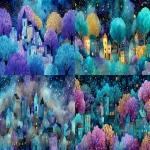
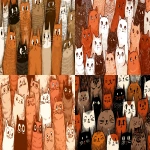
](https://images.ai-img.art/thumbnails/150/d08f607caf4a5c380defef68b778febb8911e8e51e51927b09ed67880bd3084b.webp)


